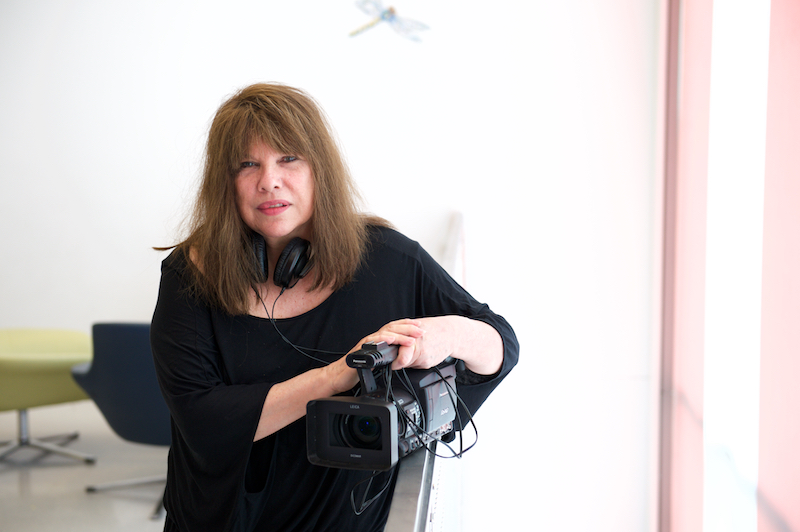
Rosemarie Reed is an adjunct professor at BMCC and filmmaker whose biographical documentaries focus on individuals “who have made great contributions but aren’t household names,” she says. “One friend told me, ‘you make films about the most famous people that no one ever heard of’.”
These lesser-known individuals include scientists such as Irène Joliot-Curie, Lise Meitner and Otto Hahn, and she has told the stories of world leaders including former president of the Soviet Union, Mikhail Gorbachev. “I have also told the stories of victims of genocide and human rights abuses,” says Reed, whose work has been supported through a $1,600,000 grant from the Alfred P. Sloan Foundation, a $100,000 award from the National Science Foundation and other granting agencies. Her films have screened on PBS, The History Channel, and networks in Europe, Australia and Canada.
She has also shared her films with students at BMCC, where she has taught in both the Academic Literacy and Linguistics Department, and the English Department. Much of her work is available through Kanopy streaming in the BMCC library, searchable through “Rosemarie Reed.”
Unveiling the histories of women scientists
A major topic for Professor Reed’s films is women scientists, particular those who have not been given the place in historical chronicles that their accomplishes warrant.
“One film I did is about the daughter of Marie Curie,” says Reed. “Everyone knows Marie Curie, who was awarded the 1911 Nobel Prize in Chemistry for her discoveries and studies of the elements radium and polonium, but they don’t know that Marie Curie’s daughter, Irene Joliot-Curie, also won a Nobel prize, for the discovery of artificial radiation. Her mother and father won the prize for prize for natural radiation, and her work focused on the synthetic version.”
Reed’s students at BMCC have viewed the films and written essays about them. After showing them the film on the Curie family, she shared primary sources; letters between the physicist Otto Hahn and Lise Meitner, which the students summarized. “They not only learned the skill of summarization, they got a perspective on women’s role in science history that had an impact on their own goals,” says Reed.
The Alan Turing story: Expanding an understanding of struggle
Reed’s current project is a documentary, Forgetting the Many, the Royal Pardon of Alan Turing, now in post production and funded in part by a grant from the Arch and Bruce Brown Foundation. She plans to distribute it to public television in the United States and internationally, as well as distributing it to colleges and universities.
BMCC students should know about Alan Turing, says Reed, “because Alan Turing during World War II deciphered the Enigma Code, saving the Allies. We won the war in the Atlantic because of that, thereby ending the war at least two years earlier than it would have. He was also a homosexual and persecuted by the English government under their Gross Indecency Laws, which were pretty much gone by 2003.”
Many students are familiar with Turing’s story because of the popular feature film, The Imitation Game. Reed explains that in 1952, Turing was exposed as a homosexual and at that time, the punishment for homosexuality in the United Kingdom was one to two years in prison under the Gross Indecency Laws.
“However, he did not want to go to prison,” she says. “He was a very gifted mathematician and was working on many different projects, so his lawyer came up with a compromise. They proposed using a drug, oestrogen, that was in its experimental stage, to give him ‘chemical castration’ instead of prison.”
Turing received injections of the drug for a year, “and went from being a very athletic man to being two to three times his size, and developing breasts. In 1954 he committed suicide by eating an apple that had been laced with arsenic,” Reed says.
Then in December 2013, “Queen Elizabeth gave Turing a royal pardon, but did not issue a blanket pardon for the rest of the 50,000 men imprisoned under the Gross Indecency Laws,” says Reed. “This group included pedophiles, rapists and others, as well as the gay men — 15,000 of whom are still alive —who had been imprisoned or in a few cases undergone chemical castration.” In England, she says, “many have taken up the cause of the gay men prosecuted under this law, and my camera is documenting their efforts.”
Reed stresses that BMCC students should know, “the LGBT movement didn’t happen overnight. As our students expand their own understanding of their rights, to put it in the context of other people’s rights is important. Struggle happens in many different groups.”
Her latest project, with the tentative title, Playing in the FM Band, is about the life and times of Steve Post, who was a public radio pioneer at WBAI-FM in New York in the late 1960s and early 1970s, as well as Morning Music host at WNYC for almost 25 years. “He was one of the first people to develop the concept of free-form radio, in which the hosts just got funding from a private donor,” Reed says. “This feature documentary will be widely screened, and BMCC students will be among its first audience.”
STORY HIGHLIGHTS
- Adjunct Professor Rosemarie Reed is a documentary filmmaker who shares her work with students
- Her film about mathematician Alan Turing is in post-production
- Turing deciphered the Enigma Code, saving the Allies and helping to end World War II

